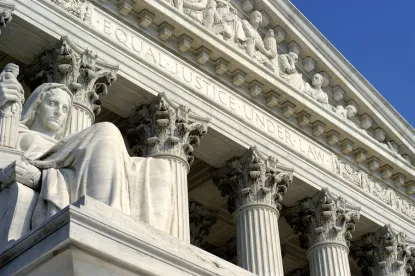Tall ships, terror and treasure formed the backdrop in the recent oral arguments in Allen v. Cooper before the Supreme Court. Blackbeard’s ship, Queen Anne’s Revenge, lies on the bottom of the ocean off the coast of North Carolina where teams of nautical archaeologists have been working since its discovery in 1996 to bring artifacts to the surface. But now this copyright infringement case, related to the recovery of the legendary pirate ship, will cause the Court to examine more than barnacle encrusted canons. The court has the opportunity to take another look at a different type of piracy—intellectual property infringement by the states. Although the case pertains specifically to the Copyright Infringement Clarification Act (CRCA), it could become the vehicle to revisit the underlying assumption of a group of cases that have left patent, trademark and copyright owners without recourse when their intellectual property rights are infringed by states.
Frederick Allen and his company Nautilus Productions, LLC, began documenting the salvage efforts surrounding Queen Anne’s Revenge through videos and still images (“works”) after being retained by Interstal, Inc, the private research and salvage firm that discovered the ship that ran aground in 1718. Allen registered copyrights for the works which are licensed to and commercialized by Nautilus. Sometime before 2013, North Carolina (specifically its Department of Natural and Cultural Resources) infringed Nautilus’s copyright by copying and publicly displaying Nautilus’s works online without Nautilus’s permission. In its settlement agreement with Nautilus, North Carolina agreed to pay Nautilus $15,000 and agreed not to infringe going forward.
Alleging further infringement of the works in print and online, Nautilus sued again in federal court in the Eastern District of North Carolina in 2015. The State moved to dismiss on the basis of the Eleventh Amendment sovereign immunity which precludes suits against the states. The district court denied the motion and held that Congress validly abrogated state sovereign immunity in the CRCA. The Fourth Circuit Court of Appeals reversed the district court, so Allen filed a petition to have his case heard by the Supreme Court. Having succeeded in convincing at least 4 justices that the case was worth hearing, Allen left the high seas for the high court.
But Allen isn’t making the journey alone. Thirteen organizations filed briefs with the Supreme Court in support of reversing the Fourth Circuit and upholding the CRCA. These thirteen amici curiae represent a variety of parties ranging from those interested primarily in the Constitutional issue presented by the case (e.g., Washington Legal Foundation, a non-profit, public-interest law firm that “promotes and defends free enterprise, individual rights, limited government, and the rule of law.”) to those who are more directly impacted by the remedies afforded by the CRCA (e.g., The American Society of Media Photographers, Inc., “a 501(c)(6) non-profit trade association representing thousands of members who create and own substantial numbers of copyrighted photographs.”). Together with the five organizations that filed briefs in support of North Carolina’s position, these amici curiae reflect the intense interest in the issues presented.
How widespread is this problem of state infringement of copyrights? At the time of the enactment of the CRCA in 1990, Congress relied on 16 instances of state infringement but saw that the problem had the potential to grow. And indeed it seems to have done just that. Since the year 2000, victims of copyright infringement have filed 150 cases against states according to a recent compilation cited in the Copyright Alliance and the US Chamber of Commerce amici curiae brief. Even this accounting is an understatement of the extent of the problem. As the plaintiffs’ amici point out, many small businesses and independent creators lack the resources even to detect copyright infringement let alone pursue a remedy, particularly if it involves filing a lawsuit.
An intellectual property owner injured by an infringing state faces a daunting legal landscape. In most instances, a citizen cannot sue a state for a violation of federal law in either federal or state court (Hans v. Louisiana (1890) and Alden v. Maine (1999)). But the Court has recognized narrow exceptions to this state sovereign immunity. States can waive their immunity, for example. In addition, under certain conditions, Congress can pass laws that allow suits against the states. In a series of cases, however, the Court has struck down legislation aimed at allowing citizens to sue states for infringement of intellectual property. The Fourth Circuit’s holding in Allen is following the course the Supreme Court charted in these cases. Allen hopes to persuade the Court to take a different tack. Assuming that Allen succeeds, and depending on the basis for the Court’s decision, the holding in this case could impact not only copyright owners but patent owners as well.
How so? Consider how the Court navigated to its present position. Although Congress’s power to legislate in the area of intellectual property derives directly from Article I of the Constitution, the Supreme Court declared in Seminole Tribe v. Florida (1996) and Florida Prepaid Post-Secondary Education Expense Board v. College Savings Bank (1999) that Congress cannot rely on Article I powers to abrogate state sovereign immunity. Faced with this precedent, neither the District Court nor the Fourth Circuit in Allen closely examined an Article I basis for Congress’s power to enact the CRCA. Instead, they considered as the more relevant question whether Congress properly abrogated state sovereign immunity under the enforcement provisions of Section 5 of the Fourteenth Amendment. The Fourteenth Amendment gives Congress the power to enforce its provisions, including the clause prohibiting states from depriving any person of life, liberty or property without due process. But Congress’s enforcement efforts must remain “congruent and proportional” to the underlying violation.
If Allen succeeds because the Court upholds the CRCA as a valid exercise of Congress’s enforcement powers under the Fourteenth Amendment, then its impact will be primarily limited to copyright owners; but Allen has charted a more ambitious course. In both his brief and oral argument, Allen’s counsel led with the Article I issue, signaling his confidence in the strength of his position. At oral argument, Allen’s attorney summed up the sentiments of an intellectual property holder faced with infringement by a state: “When states infringe the exclusive federal rights that Congress is charged with securing, Congress can make states pay for doing so.” Article I, Section 8 of the Constitution, Allen points out, lays down an express constitutional mandate for Congress to protect specific private property rights against any and all intrusion giving Congress the power “to promote the progress of science and useful arts, by securing for limited times to authors and inventors the exclusive right to their respective writings and discoveries.” For Congress to be unable to force states to pay damages when it infringes these rights, Allen argues, would be nonsensical.
Allen hopes to persuade the Court that in fact Article I’s Intellectual Property Clause gives Congress the power to abrogate state sovereign immunity in order to secure the exclusive rights. If the Court agrees, then by that same reasoning Congress validly enacted not only the CRCA but also the Patent Remedy Act, thought to be a dead letter law since the Florida Prepaid decision in 1999. Florida Prepaid struck down the Patent Remedy Act, Congress’s effort to give patent owners recourse against a state infringer. Allen contends, however, that in reaching its decision, the Florida Prepaid Court failed to examine the Article I basis for Congress’s authority to pass the act. Relying on language in Seminole Tribe, the Court in Florida Prepaid simply assumed that “Congress may not abrogate state sovereign immunity pursuant to its Article I powers.” But in a 2006 case, Central Virginia Community College v. Katz (a bankruptcy case), the court called this blanket assumption in Seminole Tribe “erroneous.” Allen argues that Katz gutted the foundation of the Court’s earlier decision in Florida Prepaid. Even counsel for North Carolina conceded at oral argument that if the Court rules on the basis of Article I, Florida Prepaid would be effectively overruled.
North Carolina’s counsel tried to argue that the Court should sustain the reasoning in Florida Prepaid and view Katz as a case that pertained to the unique area of bankruptcy. Besides, he contended, parties rely on the present state of the law. At least some members of the Court appeared unpersuaded. Echoing Justice Ginsburg, Justice Kagan pointed out “that it’s not the strongest reliance argument to say we relied on this—this Court’s holding to infringe other people’s rights.”
If the Court upholds the CRCA on the basis of Congress’s Article I powers, that suggests that Congress can also abrogate state sovereign immunity on the basis of the Intellectual Property Clause and allow patent owners to sue state infringers in federal court. Most commentators believe that the Court will refrain from reversing course in its Article I Intellectual Property Clause jurisprudence and will decide the case on the basis of the Fourteenth Amendment or will otherwise narrowly craft its holding, keeping the impact of the case confined to copyright owners and to a very narrow set of circumstances. The Court’s questioning and the posture of the plaintiff, however, suggest the impact of this case may be much more significant. Like the Queen Anne’s Revenge on the bottom of the Atlantic, the Article I issue has long remained unexamined. This may be the case that salvages it. That could signal fair winds and following seas ahead for patent owners.




 />i
/>i
